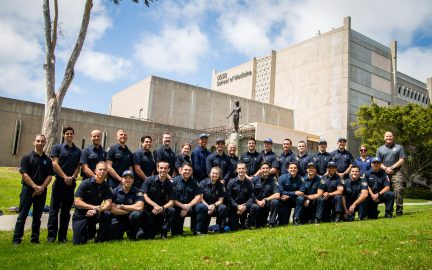What is a Paramedic (EMT-P)?
An EMT-P provides advanced emergency treatment to patients in the pre-hospital setting. Saving lives is the most rewarding aspect of a paramedic career. The well-trained paramedic can also reduce the length of a patient’s hospital stay by preventing the danger of more serious injury that could occur through incorrect treatment in the stages before hospitalization. Paramedics are in high demand in both private and fire department settings.

How do I become a Paramedic?
To be eligible for the Paramedic Program, you must be a high school graduate or equivalent. Applicants must also possess a current EMT-Basic certification and must have worked in the field (pre-hospital experience) with at least 1200 hours of PAID work experience (EMT hours gained in the reserve fire fighter role will be accepted as long as the applicant has been assigned as an EMT and is functioning in that role when on duty with the fire department) prior to application deadline. In addition, applicants must have completed a college level Anatomy & Physiology-BIO-145 (formerly ZOO 145) and the Paramedic Prep (EME-175& 175L) classes.
Costs and fees are listed on the “Fees” page of this web site.
Acceptance into the Paramedic Program is by special application and you must undergo a testing and interview process. If you meet all qualifications, you can complete an application from this website during the open application period. Our application period for the January class begins in September to October. Our application period for the August class is February to March. Applications are available on our web site at these times.
The Paramedic Academy is two semesters. The first semester is the didactic (lecture) portion of the program; classes are four to five days per week. The second semester consists of four weeks working in the hospital clinical setting performing direct patient care. Then you are assigned a field internship for the rest of the internship. This internship lasts approximately 2.5 to 3 months.
During the field internship, the student is assigned to a Paramedic Field Preceptor where you actually work alongside trained Paramedics at area Fire Departments and private ambulance services. This internship gives you actual hands on field training and prepares the student to take the National Registry EMT-P exam for licensure.
Paramedic Academy Minimum Goals:
Program Learning Outcomes:
Paramedic Academy Courses
EME 206/206L – Introduction to Paramedic Training
EME207/207L – Paramedic Medical Training
EME 208/208L – Paramedic Trauma Training
EME 209/209L – Paramedic OB/Peds Training
EME 210 – Clinical Internship
EME 211 – Clinical Integration I (Taken concurrently with EME (207-207L)
EME 212 – Clinical Integration II (Taken concurrently with EME (208-210)
EME 215 – Field Internship
Additional Specialty training courses included in the program are:
T.E.C.C.
A.C.L.S.
P.H.T.L.S.
P.E.P.P
NOTE: To participate in the hours required for your Clinical internship, students are required to have a flu shot and/or H1N1 vaccine. Be warned that if you choose not to have these injections, your required clinical time may be cancelled and therefore you will not successfully complete the Paramedic Program.
NOTE: All paramedic students, once accepted into the Paramedic program, must submit a copy of current TB test results that are less than one year old. Your TB test must be current during the duration of the entire course. If it expires during the course, you must submit new results before your current TB test expires.
NOTE: A background investigation must be completed prior to acceptance into the paramedic program. The search will include the following:
- Criminal History Record Search
- Social Security Number Trace (residential history, year and State SSN issued)
- OIG/GSA – Medicare/Medicaid Excluded List
- Nationwide Sex Offender Registry
- 10-Panel Drug Screening-first dilute urine reading disqualifies a person from entering the program
Never initiate the background check until officially accepted into the paramedic program. Due to the strict requirements of each clinical site, students with any of the following situations may be denied acceptance by the clinical site and, therefore, may not be allowed to begin and/or continue in the paramedic program:
- Felony convictions of any kind
- Drug related offenses
- Conviction of abuse, battery, violence, hate crime, theft or dishonesty
- History of repeated offenses
- Active warrant for arrest
- On probation of any kind
- Dilute urine drug screening-1st test
The background check procedure should not be initiated until advised by the EME Department.

